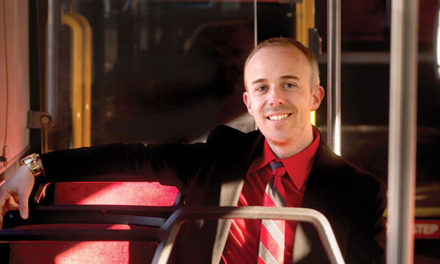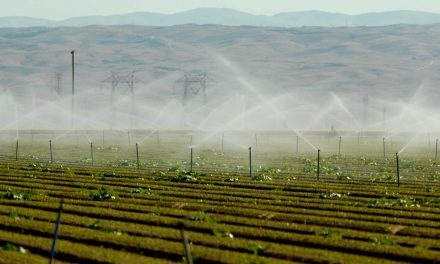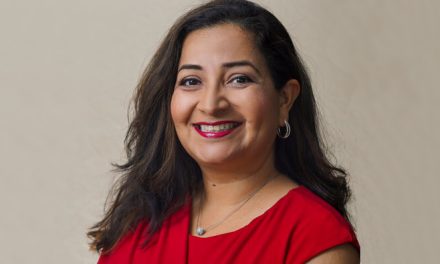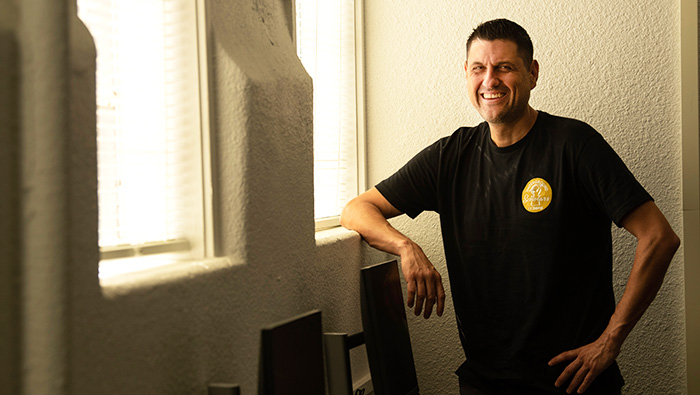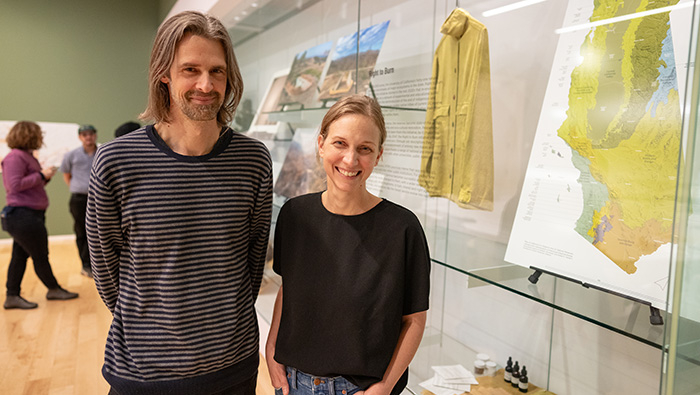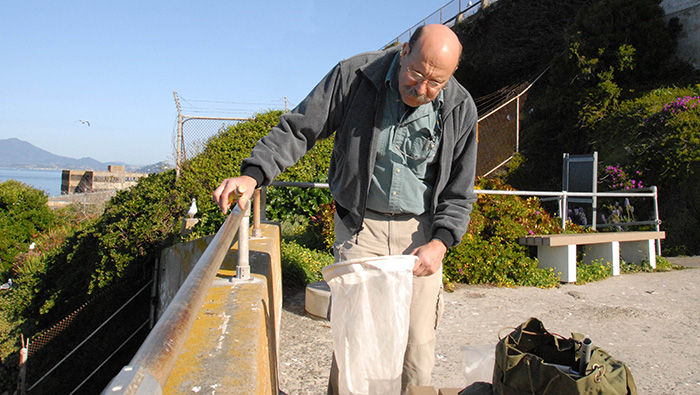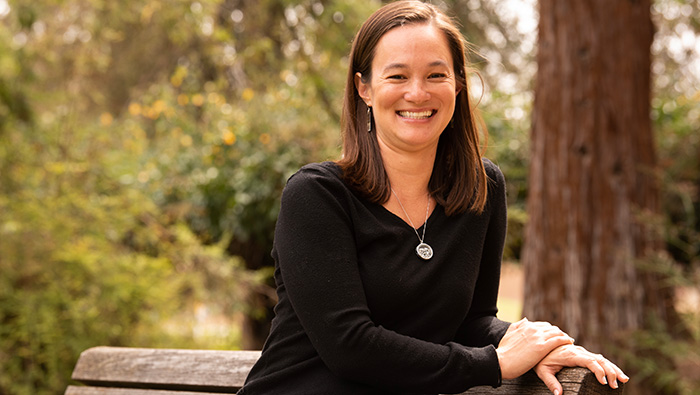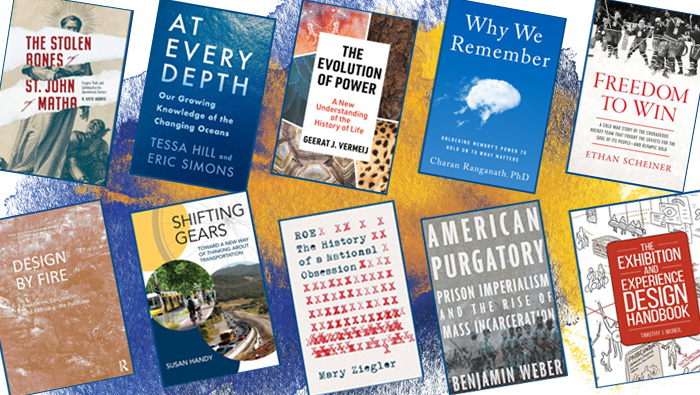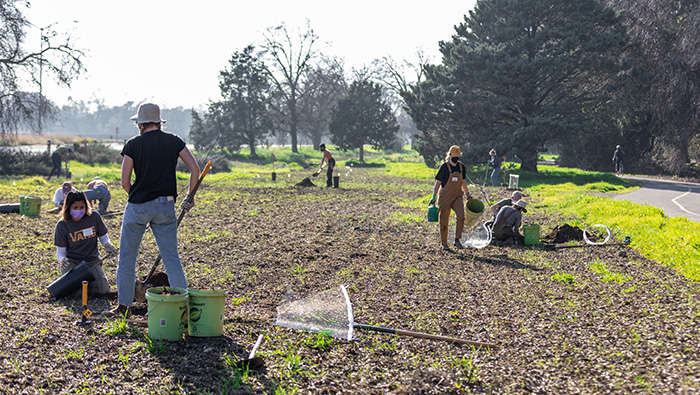
The reference site seen here is on the north side of Old Davis Road near the visitor kiosk and across the street from the Robert Mondavi Institute teaching vineyard.
Dawson Diaz/UC Davis
Planting Trees for the Next 100 Years
UC Davis’ leafy trees impressed Nurjannah Wiryadimejo enough that they helped her decide to become an Aggie. “I’d never seen such beautiful tree-lined streets like the ones by the Memorial Union,” she said.
But over half of the 24,000-plus trees on campus may be vulnerable to increased heat and extreme weather events by 2100, according to climate change models.
Fortunately, Wiryadimejo is part of a team led by the UC Davis Arboretum and Public Garden that’s working to adapt the campus tree canopy for the next 100 years — with the first-of-its-kind UC Davis Living Landscape Adaptation Plan and help from students, planners, researchers and volunteers.
Storms and heat challenge trees
Each year Tyler Kern, the campus urban forester, identifies dying trees to remove for safety — and this year, climate impacts were visible.
“Tree failures from [January’s storms] far surpassed anything we’ve seen before,” Kern said. More than 100 trees fell from the storms, in addition to 150 unsafe trees removed beforehand. The closest comparison was in 2016, with 40-50 trees damaged.
Many replacement trees this year were planted near heat islands, where asphalt holds heat after hot days. “I wanted to replace those trees where shade could be the most beneficial on campus, so the benefits aren’t just for the people or vehicles occupying the shade itself, but also potentially for all of campus,” Kern said.
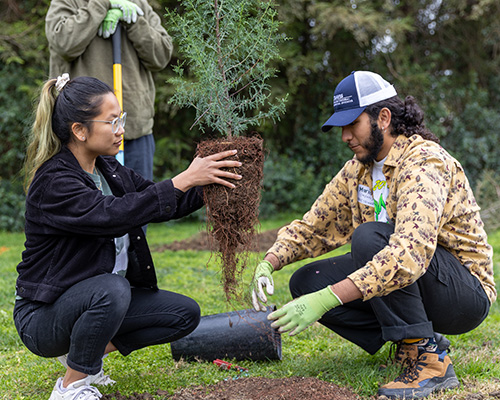
UC Davis students, employees and community volunteers are helping to plant new trees throughout campus.
Dawson Diaz, UC Davis
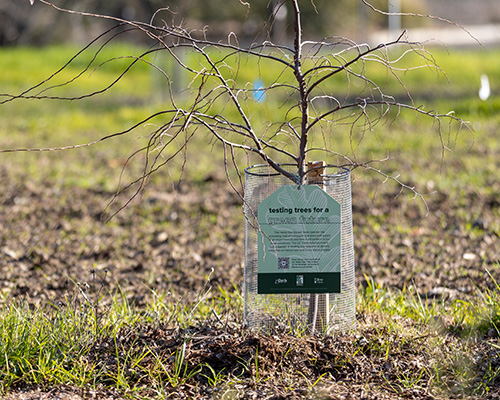
Some of the newly planted trees have signs that explain the experiment.
Dawson Diaz/UC Davis
Trying new trees — from Texas
Figuring out which trees to plant is another challenge. A safe bet used to be to find a century-old tree thriving nearby — and plant another one.
“How a tree grew in the past is no longer a good predictor of its future success,” said Emily Griswold, senior staff horticulturalist for the Arboretum and Public Garden. “Instead, we need to look at trees that are currently doing well in places that look more like our future climate.”
One such place? Texas. That’s where Griswold found trees accustomed to extreme heat, drought and alkaline soils — all practical considerations for growing in Davis, now and in the future. Another consideration is appearance, since hotter climates often mean sparse trees with small leaves. Griswold’s goal is lush-looking but water-thrifty, with varied colors and textures.
Students power the tree trial
In 2019, Griswold went to Texas to collect plant material from 40-plus species to propagate back in Davis, with a small team including a student apprentice.
“Student interns have been involved in every aspect of this tree trial,” Griswold said.
As an intern, Sam Vitt ’23 helped care for the trial’s “baby trees” in the Arboretum nursery through the Learning by Leading program. Before she and Wiryadimejo graduated this spring, they co-led a team of students who helped plant almost 400 trees around campus.
“Walking through campus and seeing all the trees that have been planted and knowing that was led by our little team of 10 is really rewarding,” Vitt said.
Learning from California’s ‘climate-ready’ tree experiment
Where the Texas trees are planted on campus borrows science from another UC Davis-hosted experiment — a statewide project that coined the term “Climate-Ready Trees,” back in 2015. Alison Berry, professor emerita, is a lead researcher on this 20-year experiment testing 12 promising tree species for California cities, with a campus reference plot plus sites throughout the state.
Griswold was inspired by this experiment’s design, planting a reference site with all the Texas species. More sample trees are dispersed throughout campus landscapes, including gardens, rural spaces and roadsides.
“Having others [use our design] as a starting point is exciting,” Berry said. “If we could have tried 100 species instead of just 12, we would have.”
Expanding impacts to the region
The Arboretum and Public Garden team hopes their work with climate-ready trees on campus will ultimately benefit our region — and our backyards.
Griswold is working with other experts from UC Davis, CalFire, the USDA Forest Service and local cities to identify recommended climate-ready trees for the region.
“It’s a very empowering message,” Griswold said. “People who work with trees and urban landscapes have an important role to play in continuing to make cities livable places for everyone.”


